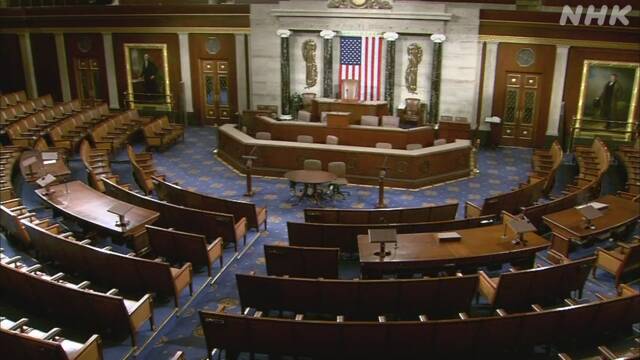A bill reflecting the agreement between President Biden and Speaker McCarthy, an opposition Republican, over raising the U.S. government's debt ceiling and debt ceiling has begun in a House of Representatives committee, and the focus is on whether the process for passage will proceed smoothly due to opposition among some hardline lawmakers.
President Biden and the opposition Republican Speaker of the House McCarthy have reached a final agreement to raise the U.S. government's debt ceiling by suspending its application until January 2025.
The agreement sets an upper limit on expenditures in the government budget, and limits expenditures other than defense spending to about the same amount in FY1 compared to FY24, and by only about 23% in FY25.
A bill reflecting the contents of the agreement needs to be passed by both houses of Congress, and Speaker McCarthy has indicated that he will vote on it in the plenary session on the 1st, and before this, deliberations in the House committee began on the 31th.
While President Biden and Chairman McCarthy have expressed confidence in the passage of the bill, some lawmakers have voiced opposition, including a hardline Republican member of the committee who said on the 30th that he would "do anything to block the bill."
Treasury Secretary Janet has warned that if the cap is not raised, the bank will default on May 30, and the focus is on whether the passage process will proceed smoothly.
The content of the bill is as follows:
The content agreed by President Biden and the speaker of the House of Representatives McCarthy, the opposition Republican, was compiled as a "Fiscal Responsibility Bill" and submitted to Congress.
The bill suspends and raises the application of the debt ceiling until January 2025 to avoid default = default of US government bond obligations.
Regarding this deadline, the Republican Party initially asked that the Biden administration wait until next March after the presidential election next fall, and the Biden administration's argument passed.
On the other hand, the spending cuts sought by Republicans will limit non-defense spending to about the same amount in 1 and about 3% in 2023 compared to fiscal year 2024.
In addition, the stricter conditions for providing food assistance for low-income people, which the Republican Party had called for, were included, but the tightening of the conditions for using Medicaid, a health insurance system for low-income people, which the Democratic Party had opposed, was postponed.
Meanwhile, it included expediting the government's licensing process for oil, natural gas, minerals and other resource development projects sought by Republicans receiving support from the oil and gas industry.
In addition, President Biden has advocated strengthening taxes on large corporations and the wealthy, and the Republican Party opposes this, including cutting the budget of the IRS = Internal Revenue Service, which is the Japan National Tax Service.
The increase in the IRS's budget was included in the "Inflation Control Act" passed by the Biden administration last year, but the Republican Party insisted.

